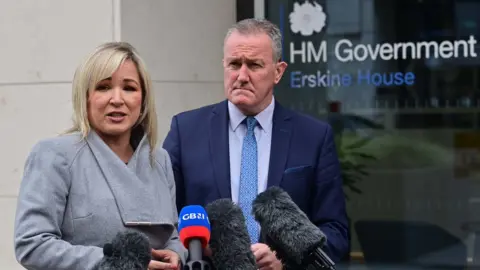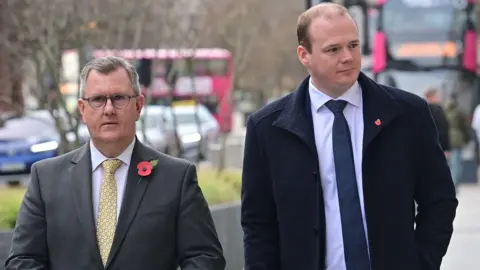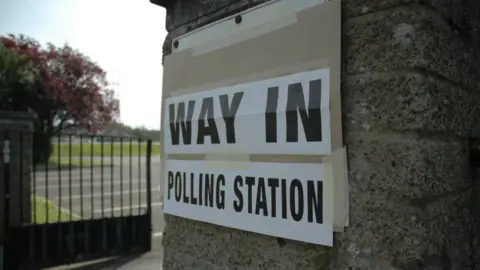NI election: No clarity on Stormont plans, say NI politicians
 Pacemaker
PacemakerThe Northern Ireland secretary has given no clarity over what he intends to do about a potential Stormont election, politicians say.
Chris Heaton-Harris has been holding talks with the parties entitled to executive seats to discuss the "next steps" amid the political deadlock.
He has repeatedly said he will call an election, with the deadline for restoring power-sharing having passed.
After last Friday's deadline for reforming a power-sharing executive was missed, an election must be held within 12 weeks.
Sinn Féin wants clarity about a vote, while the Democratic Unionist Party (DUP) said more talks were "pointless".
 Pacemaker
PacemakerMr Heaton-Harris had a 30-minute meeting with Sinn Féin vice-president Michelle O'Neill on Tuesday morning.
She said he did not "colour in the lines" and that and the public had been "left in limbo".
Ms O'Neill said the issue of MLA pay, which has continued despite the lack of a functioning executive, was not mentioned.
Speaking after his meeting with Mr Heaton-Harris DUP leader Sir Jeffrey Donaldson said he was no nearer to knowing if there would be an assembly election.
"The secretary of state has not told us when he is going to call an election," he said.
"If an election is called we are ready to fight that election," he added.
In a statement issued following the meetings, Mr Heaton-Harris reiterated that he was under a legal obligation to call an election.
He said he listened to the politicians' views on calling that election and said he would provide a further update on the next steps "in due course".
"I am particularly worried that the executive has an enormous black hole in its budget, which potentially has serious implications for the delivery of many of Northern Ireland's public services," Mr Heaton-Harris added.
"Measures to set a budget will be required in the short term."
 Pacemaker
PacemakerDevolved government in Northern Ireland has not functioned fully since February.
The DUP has blocked the restoration of power-sharing in its protest against the post-Brexit trading arrangement known as the Northern Ireland Protocol.
Sir Jeffrey urged the government to have "a razor-like focus" on getting a solution to the Protocol issue.
The Alliance Party leader said the Northern Ireland secretary was "clearly taking time" over what to do next.
Naomi Long said the fact Mr Heaton-Harris had paused was "a good sign" but she said a decision over an election "can't be strung along for weeks".

Analysis: Difficult to imagine a resolution
by Darran Marshall, BBC News NI political correspondent
Chris Heaton-Harris repeatedly made clear that if politicians missed the night's deadline to restore the executive then it was his intention to trigger an election.
Then came Friday - he emerged on to a busy city centre street in Belfast and U-turned.
Now the leaders of the four parties entitled to sit in an executive have been meeting him.
While the possibility of a pre-Christmas election remains, is the DUP going to suddenly change tack by removing its veto on power-sharing?
There's nothing to suggest that is the case.
If the Northern Ireland Office was hoping a late-night statement on Sunday would bring clarity to the situation, it was wrong.
It said these talks would be about the next steps, including budgets, how to protect public services and considering options on pay for MLAs.
Why would they need to tackle MLAs' pay if there was a possibility Stormont would be back in the short term?
Perhaps a clue that the government acknowledges the institutions are not returning any time soon.

The Ulster Unionist Party (UUP) leader said it is clear the Northern Ireland Office (NIO) "has no plan" what to do next.
Doug Beattie said Mr Heaton-Harris intends to call an election but it is not clear when.
In a statement issued on Sunday night, the Northern Ireland secretary said he would "be outlining to the parties that the people of Northern Ireland deserve a strong and accountable government".
He added: "There are a number of things I could do, including taking action on MLA pay, which I know many people feel is deeply unfair while the assembly is unable to function fully.
"I am also concerned by the issues within the Stormont budget and will address these urgently with my officials and those from the Northern Ireland Civil Service."

Read more: Stormont crisis explained

On Monday, Sinn Féin's Conor Murphy accused the DUP of creating a "political limbo" for Northern Ireland by "holding out and preventing us from forming an assembly".
Gordon Lyons of the DUP said his party would not change its stance until the UK government made changes to the Northern Ireland Protocol.
He said that talk of an election was a "distraction from the real work that actually needs to be done".
The previous assembly election in May resulted in Sinn Féin winning the most seats for the first time.

That meant Ms O'Neill was entitled to the role of first minister.
The DUP was the second-biggest party but it refused to nominate a deputy first minister, meaning a ruling executive for Northern Ireland could not be formed.
In the run-up to that election the DUP withdrew Paul Givan from the first minister post in protest over the Northern Ireland Protocol.
The protocol keeps Northern Ireland aligned with some EU trade rules to ensure that goods can move freely across the Irish land border.
Unionist parties argue that the protocol has undermined Northern Ireland's place within the UK by effectively creating a trade border between Great Britain and Northern Ireland.
